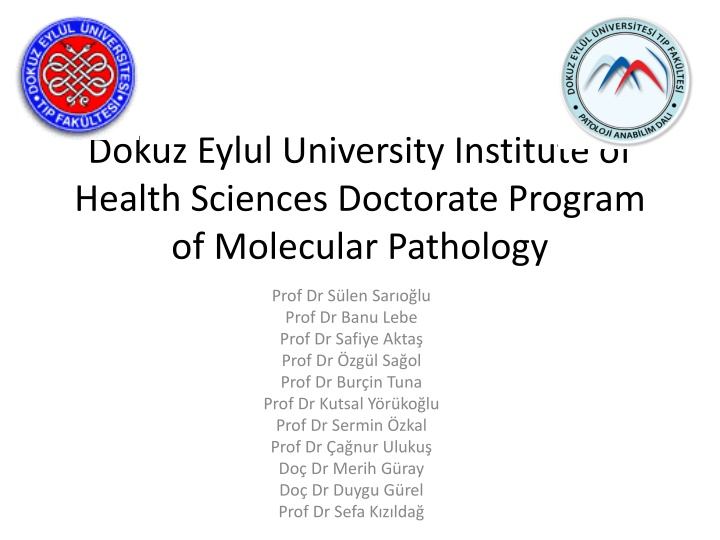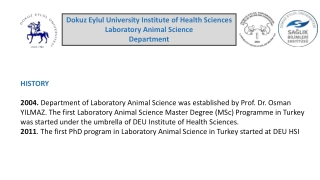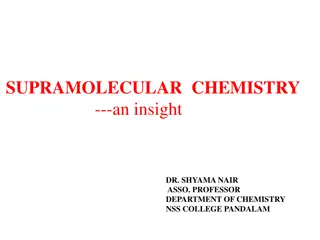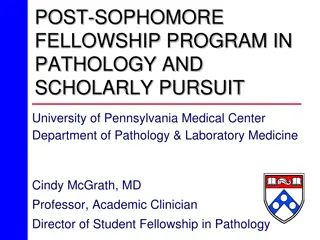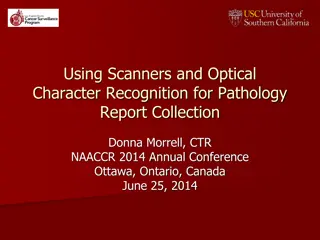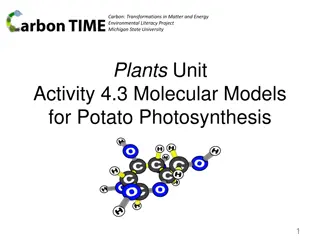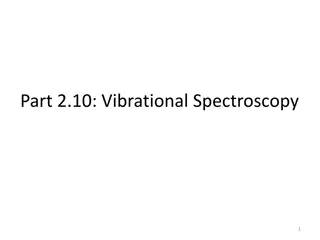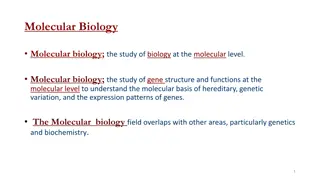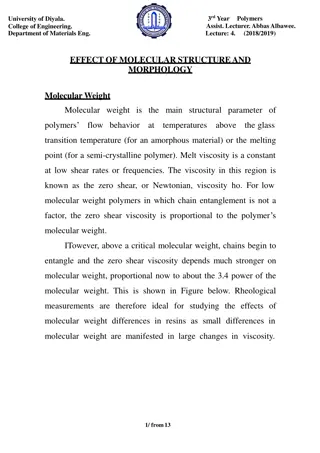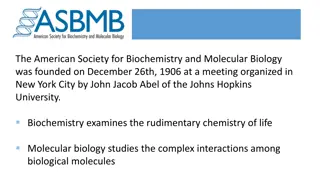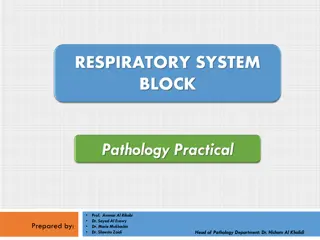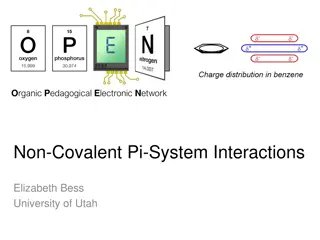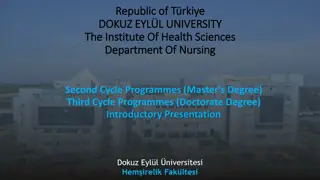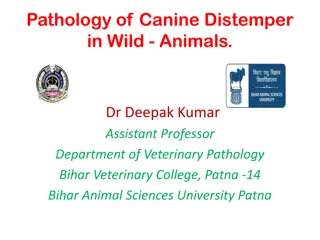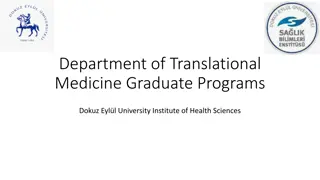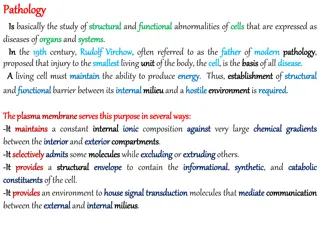Molecular Pathology Doctorate Program at Dokuz Eylul University
"Dive into the comprehensive Molecular Pathology Doctorate Program at Dokuz Eylul University, offering a multidisciplinary approach to researching, diagnosing, and treating diseases at a molecular level. Explore cutting-edge methods in genetic analysis, laboratory techniques, and research skills to equip students for independent research in the field. With a team of distinguished professors and a focus on holistic pathology reports, this program aims to advance knowledge in diagnostic medicine and cancer treatment, integrating histopathology, immunohistochemistry, and more. Discover the future of molecular pathology and its impact on the medical field."
Download Presentation

Please find below an Image/Link to download the presentation.
The content on the website is provided AS IS for your information and personal use only. It may not be sold, licensed, or shared on other websites without obtaining consent from the author.If you encounter any issues during the download, it is possible that the publisher has removed the file from their server.
You are allowed to download the files provided on this website for personal or commercial use, subject to the condition that they are used lawfully. All files are the property of their respective owners.
The content on the website is provided AS IS for your information and personal use only. It may not be sold, licensed, or shared on other websites without obtaining consent from the author.
E N D
Presentation Transcript
Dokuz Eylul University Institute of Health Sciences Doctorate Program of Molecular Pathology Prof Dr S len Sar o lu Prof Dr Banu Lebe Prof Dr Safiye Akta Prof Dr zg l Sa ol Prof Dr Bur in Tuna Prof Dr Kutsal Y r ko lu Prof Dr Sermin zkal Prof Dr a nur Uluku Do Dr Merih G ray Do Dr Duygu G rel Prof Dr Sefa K z lda
Examinations Required for Routine Pathology Report histochemistry immunohistochemistry electron microscopy Molecular Pathology Holistic Pathology Report
Diagnostic medicine Question to Answer What kind of cancer is this? How can I treat this? Which drug? Most effects - least side effects
Molecular Pathology Methods In situ hybridization (chromogen, silver, gold, fluorescent, double, multiple) (DNA or RNA) Polymerase chain reaction (Real time PCR, Reverse transcriptase PCR, electrophoresis) Microarray Sequencing (Sanger, Pyro, Next Generation)
Department of Molecular Pathology It is a multidisciplinary department established within the SBE institute in 2018 (10.01.2018) with the approval of Y K. Our department includes faculty members from the Departments of Pathology, Basic Oncology Genetics, Molecular Biology and Genetics. The duration of the program is 8 semesters and the maximum completion time is twelve semesters. The language of instruction of the program is Turkish. 8 Professors and 4 Associate Professors are involved in the execution of the program.
Molecular Pathology PhD Program Aims To train individuals with advanced basic and current theoretical knowledge in the field of molecular pathology; To equip students with advanced laboratory techniques and scientific skills such as advanced project writing, project management, data collection and analysis, international scientific communication, and scientific article writing, which prepare them for independent research.
Conditions To be Medical Pathology Specialist (Specialization certificate) and having a certificate of achievement in foreign language exams in accordance with SBE requirements 4 years, 2 semesters in 1 year, 15 weeks each semester. 240 ECTS. PhD program; It consists of at least twenty-one credits taken from the course groups specified in the teaching plans, at least seven courses, seminar, qualifying exam, thesis proposal, area of expertise course, and thesis work.
PART TIME PROGRAM Students must provide 240 ECTS credits (78 ECTS courses, 12 ECTS specialization area and 150 ECTS thesis work) to graduate. In order to be successful in each course, their grade point average must be at least 2.50 / 4.00. The measurement and evaluation methods applied for each course are defined in the Course Introduction Form prepared by the relevant faculty member(s) and included in the Information package. Regarding exams and course success grades, the relevant articles of the DEU Postgraduate Education and Training Regulation and the Health Sciences Institute Postgraduate Education and Examination Application Principles are applied. In order to be successful in the course, a minimum score of 75 (CB) is required.
LECTURES Basic Mechanisms for Molecular Pathology Laboratory Methods for Molecular Pathology Bioinformatics for Molecular Pathology Molecular Pathological Mechanisms of Diseases Biomarkers in Molecular Pathology In Silico Research Methods in Molecular Pathology
Program Gains high level of knowledge about research data, patient diagnosis, and what needs to be done regarding the material and individual safety and accuracy of his employees. the ability to integrate macroscopic evaluation methods with sampling, tissue and cell processing processes, and polecular pathological processes. Applies and evaluates immunohistochemistry, immunofluorescence, RNA and DNA isolation, polymerase chain reaction and its uses in molecular pathology, sequencing in situ hybridization and microarrayingmethods. good knowledge of the molecular pathological mechanisms of inflammatory, degenerative and neoplastic diseases at the molecular, cellular, organ and organ systems levels. Has a good knowledge of biomarkers and their effectiveness in research, diagnosis and treatment. has a good knowledge of biomarkers in cells and cell damage, inflammatory, metabolic, degenerative, neoplastic diseases and transplanted cells and organs. Has basic knowledge of modern bioinformatics and databases. has a high-level perspective on molecular information. has high-level bioinformatics application skills in research and clinical field in the field of molecular pathology. has a high level of knowledge and skills regarding scientific research methods, ethics, critical reading, research methods and statistical methods. has a high level of skill in written and verbal presentation of scientific data/results.
